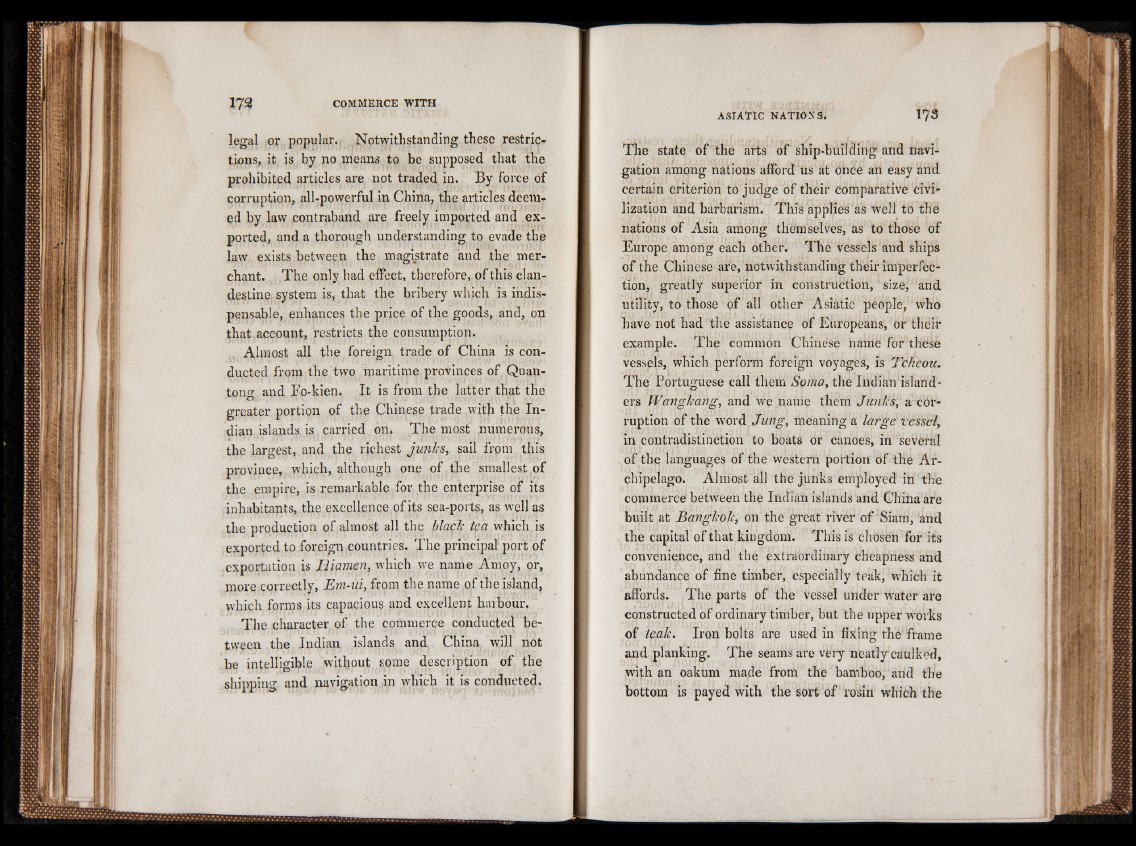
legal or popular.. Notwithstanding these restrictions,
it is by no means to be supposed that the
prohibited articles are not traded in. By force of
corruption, all-powerful in China, the articles deemed
by law contraband, are freely imported and exported,
and a thorough understanding to evade the
law exists between the magistrate and the merchant.
The only bad effect, therefore, of this clandestine
system is, that the bribery which is indispensable,
enhances the price of the goods, and, on
that account, restricts the consumption.
Almost all the foreign trade of China is conducted
from the two maritime provinces of Quan-
tono- and Fo-kien. It is from the latter that the
greater portion of the Chinese trade with the Indian
islands is carried on. The most numerous,
the largest, and the richest junks, sail frpm this
province, which, although one of the smallest of
the empire, is remarkable for the enterprise of its
inhabitants, the excellence of its sea-ports, as well as
the production of almost all the black tea which is
exported to foreign countries. The principal port of
exportation is Hiamen, which we name Amoy, or,
more correctly, Em-ui, from the name of the island,
which forms its capacious and excellent harbour, "
The character of the commerce conducted between
the Indian islands and China will not
be intelligible without some description of the
shipping and navigation in which it is conducted.
The state of the arts of ship-building and navigation
among nations afford us at once an easy and
certain criterion to judge of their comparative civilization
and barbarism. This applies as well to the
nations of Asia among themselves, as to those of
Europe among each other. The vessels and ships
of the Chinese are, notwithstanding their imperfection,
greatly superior in construction, size, and
utility, to those of all other Asiatic people, who
have not had the assistance of Europeans, Or their
example. The common Chindse name for these
vessels, which perform foreign voyages, is Tcheou.
The Portuguese call them Soma, the Indian islanders
Wangkang, and we name them Junks, a corruption
of the word Jung, meaning a large "vessel,
in contradistinction to boats or canoes, in several
of the languages of the western portion of the Archipelago.
Almost all the junks employed in the
commerce between the Indian islands and China are
built at Bangkok, on the great river of Siam, and
the capital of that kingdom. This is chosen for its
convenience, and the extraordinary cheapness and
abundance of fine timber, especially teak, which it
affords. The parts of the vessel under water are
constructed of ordinary timber, but the upper works
of leak. Iron bolts are used in fixing the frame
and planking. The seams are very neatly caulked,
with an oakum made from the bamboo, and the
bottom is payed with the sort of rosin which the